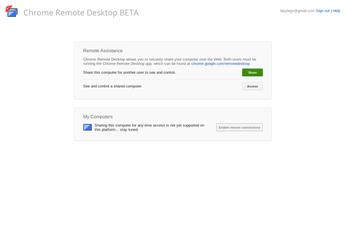Extension Watch: Chrome Remote Desktop for Google Chrome and Chromium

Productivity Sauce
A browser nowadays is more than a tool for accessing the web. With the right extensions, you can put it to many other nifty uses. Case in point: the Chrome Remote Desktop extension which turns Google Chrome and Chromium into an instant, secure, and hassle-free solution for accessing and controlling remote machines. The extension works on Linux, Windows, and Mac OS X, so you can, for example, access your Linux desktop from a Windows box.
Using the Chrome Remote Desktop extension to access remote machines is ridiculously easy. First off, make sure that the extension is installed on the machine you want to access (remote host) and the client computer. Open the extension on the remote host, press the Share button, and note the generated code. Launch then the extension on the client machine, press the Access button, enter the generated access code, and hit Connect. You should then see the remote desktop in all its glory. The only real limitation of this solution is the fact that it requires the Google Chrome or Chromium running on both ends. But if you already have the browser installed on both machines, then using Chrome Remote Desktop is a no-brainer.
Comments
comments powered by DisqusSubscribe to our Linux Newsletters
Find Linux and Open Source Jobs
Subscribe to our ADMIN Newsletters
Support Our Work
Linux Magazine content is made possible with support from readers like you. Please consider contributing when you’ve found an article to be beneficial.

News
-
New Linux Botnet Discovered
The SSHStalker botnet uses IRC C2 to control systems via legacy Linux kernel exploits.
-
The Next Linux Kernel Turns 7.0
Linus Torvalds has announced that after Linux kernel 6.19, we'll finally reach the 7.0 iteration stage.
-
Linux From Scratch Drops SysVinit Support
LFS will no longer support SysVinit.
-
LibreOffice 26.2 Now Available
With new features, improvements, and bug fixes, LibreOffice 26.2 delivers a modern, polished office suite without compromise.
-
Linux Kernel Project Releases Project Continuity Document
What happens to Linux when there's no Linus? It's a question many of us have asked over the years, and it seems it's also on the minds of the Linux kernel project.
-
Mecha Systems Introduces Linux Handheld
Mecha Systems has revealed its Mecha Comet, a new handheld computer powered by – you guessed it – Linux.
-
MX Linux 25.1 Features Dual Init System ISO
The latest release of MX Linux caters to lovers of two different init systems and even offers instructions on how to transition.
-
Photoshop on Linux?
A developer has patched Wine so that it'll run specific versions of Photoshop that depend on Adobe Creative Cloud.
-
Linux Mint 22.3 Now Available with New Tools
Linux Mint 22.3 has been released with a pair of new tools for system admins and some pretty cool new features.
-
New Linux Malware Targets Cloud-Based Linux Installations
VoidLink, a new Linux malware, should be of real concern because of its stealth and customization.


Chrome remote host for linux
Registering computers doesnt work in Linux!